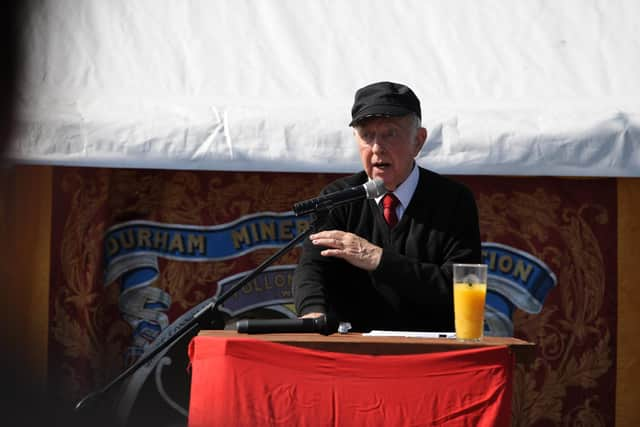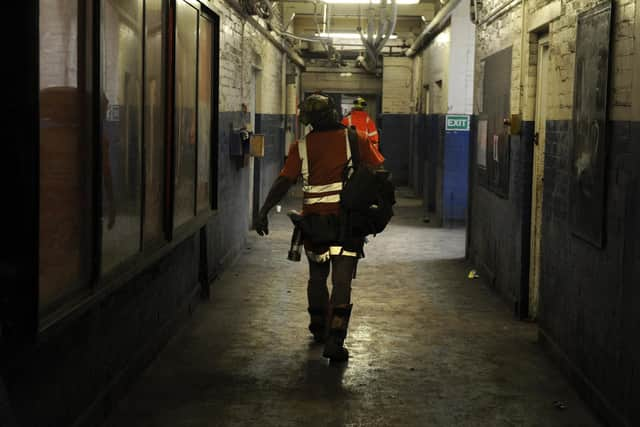Why Arthur Scargill's comments shouldn't be dismissed in conversation around levelling up - Jayne Dowle
There are still plenty of people round here who spit his name in disgust; they blame ‘Scargill’ for hardship endured during the long miners’ strike in 1984. And for the aftermath, which saw all our pits close anyway, throwing thousands out of work.
Both my grandfathers were miners, and lots of other relatives, including my cousin, who lost his job in the 1980s with a young family to support.
Advertisement
Hide AdAdvertisement
Hide AdI sit here writing this and look out at the old muck-stack of Barrow Colliery. It’s landscaped now, but there’s always something there to remind us. And nothing reminds me more than the debate over levelling-up.


When Michael Gove talks so smoothly about levelling-up, he’s glossing over damage that goes back decades. He’s not understanding that shattered communities are at the heart of it all; and few are more shattered than former mining communities. So let’s not dismiss Mr Scargill’s comments about solidarity as the ramblings of a rancourous old man.
Let’s remember that once upon a time, before successive right-wing governments encouraged every man (and woman) to look after number one, people did stick together to fight a common cause. That said, there’s a lot of nostalgic nonsense talked about working down the pit. Many men hated it and couldn’t wait to get out. And a lot of men yearn for those simpler times – I’ve run local history groups where misogyny is rife and women relegated to making the tea.
I wish I’d been interviewing Mr Scargill for the BBC last week; I would certainly have asked him for his understanding of the term ‘levelling up’. Mr Scargill was speaking to commemorate the Battle of Saltley Gate in Birmingham, considered a turning point in the national miners’ strike, called in January 1972 over demands for a 43 per cent pay-rise.
Advertisement
Hide AdAdvertisement
Hide Ad

Miners’ leaders argued that spiralling inflation caused by international forces, including the devaluation of the US dollar, had led to a huge fall in the value of their wages in real terms. How interesting to compare then with now.
Mr Scargill, an activist from the Yorkshire region of the National Union of Mineworkers (NUM), led the action, taking an estimated 400 ‘flying pickets’ to blockade the Saltley Gate coal depot. Out came an estimated 30,000 engineers and other workers and locals, including women, to join the pickets, there to prevent coal from leaving the depot, which held stocks to fuel power stations.
“Everybody in the trade union movement will realise that when a section of them is being picked off, it’s incumbent upon the rest of the movement to support them,” Mr Scargill told his BBC interviewer. “The trouble is trade union leaders of today are not learning lessons about why they should give solidarity support.”
The trouble is, I’d counter, is that for the rest of the population, the idea of collective action is as anachronistic as using a typewriter.
Advertisement
Hide AdAdvertisement
Hide AdThat event may have gone down in history as a major turning point in the 1972 miners’ strike, but it was just an opening salvo. In 1973, further strike action by miners and railway workers saw the country plunged into the “three-day week”. Businesses had their electricity supply limited to just three days and TV broadcasters were forced to shut down at 10.30pm to conserve precious power.
When Mrs Thatcher came to power in 1979, she vowed never to allow the miners to hold the country hostage again.
In the face of cheap coal imports and concerns about climate change, the last deep coal mine in Yorkshire, Kellingley Colliery, closed in 2015, marking the end of an industry which once employed millions.
Let’s not forget, coal-mining shaped not only mining communities, but also provided a source of wealth for landowners and investors, who often made their own homes far from the coalfields.
Advertisement
Hide AdAdvertisement
Hide AdIf we want to seriously consider some of the reasons why some halves of the UK seem to have it all – and others have very little at all – let’s not assume that all our troubles started when David Cameron got the keys to Downing Street in 2010 and years of austerity measures began.
When we talk now about levelling-up, we should not be afraid of exercising these long memories that Mr Scargill, at 84 years old, brings to light. What he said about solidarity might be his own inconvenient truth, but he speaks directly from the coal-face.
Support The Yorkshire Post and become a subscriber today. Your subscription will help us to continue to bring quality news to the people of Yorkshire. In return, you'll see fewer ads on site, get free access to our app and receive exclusive members-only offers. Click here to subscribe.
